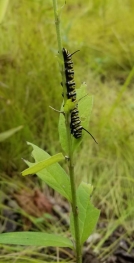
Some writers have a way of saying things that helps me "get it" the first time. One of those writers is Douglas Tallamy, the University of Delaware professor, entomologist, and ecologist, whose latest book, "Nature's Best Hope" came out late last year. (Timber Press, 2019).
He offers ecological shorthand for those of us who don't want to take a lifetime to understand what we can do to slow the loss of plants, birds, and insects.
“Plants, in essence, enable animals to eat sunlight,” he says, summarizing ecological science in eight words. “Insects are the animals that are best at transferring energy from plants to other animals.”
The transfer, however, is not simple. “Insects are very fussy eaters,” he says. To paraphrase his message: Not just any plant can sustain any insect. Not just any insect can pollinate or disperse seeds for any plant. Native plants make a difference. He explains the particular role of caterpillars, which are key to moving energy from plants to other parts of food chains.
More than in Tallamy's previous books, Nature's Best Hope puts a magnifying glass on the problem of habitat fragmentation. It is not enough to conserve open spaces as parks, he says. We must create our own “Homegrown National Parks.”
He also takes on a difficult topic that, in my opinion, is too little discussed. That topic is the public pushback some face as they try to naturalize their land. He dissects the challenges of changing behaviors and reshaping attitudes towards landscape appearances and land care practices.
The book also provides updated research on "nativars," which are native plants bred with characteristics that appeal to consumers. It also devotes a chapter to the pressing questions that audience members ask during Tallamy's talks.
I am glad I read Nature's Best Hope, and recommend it.
